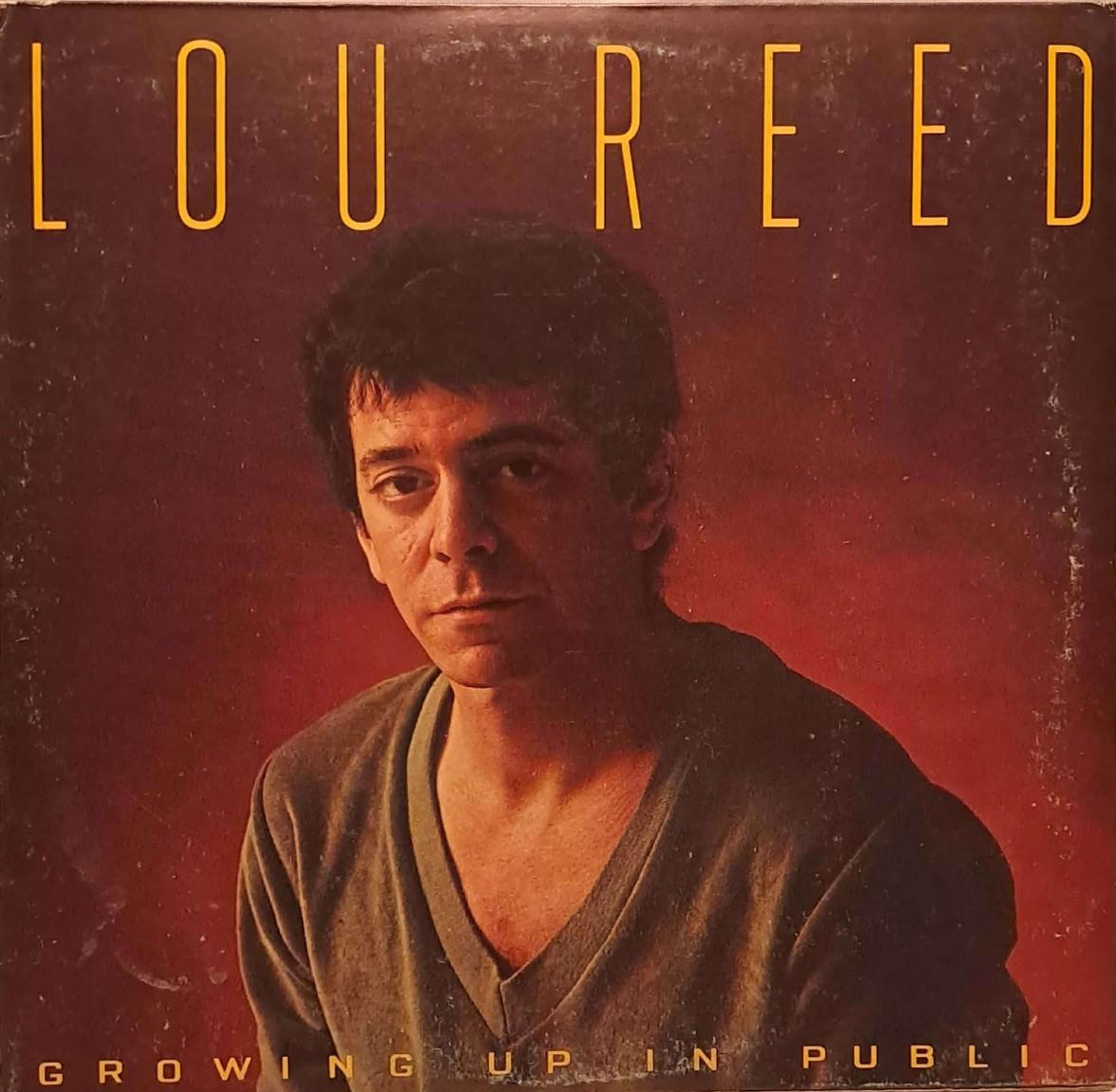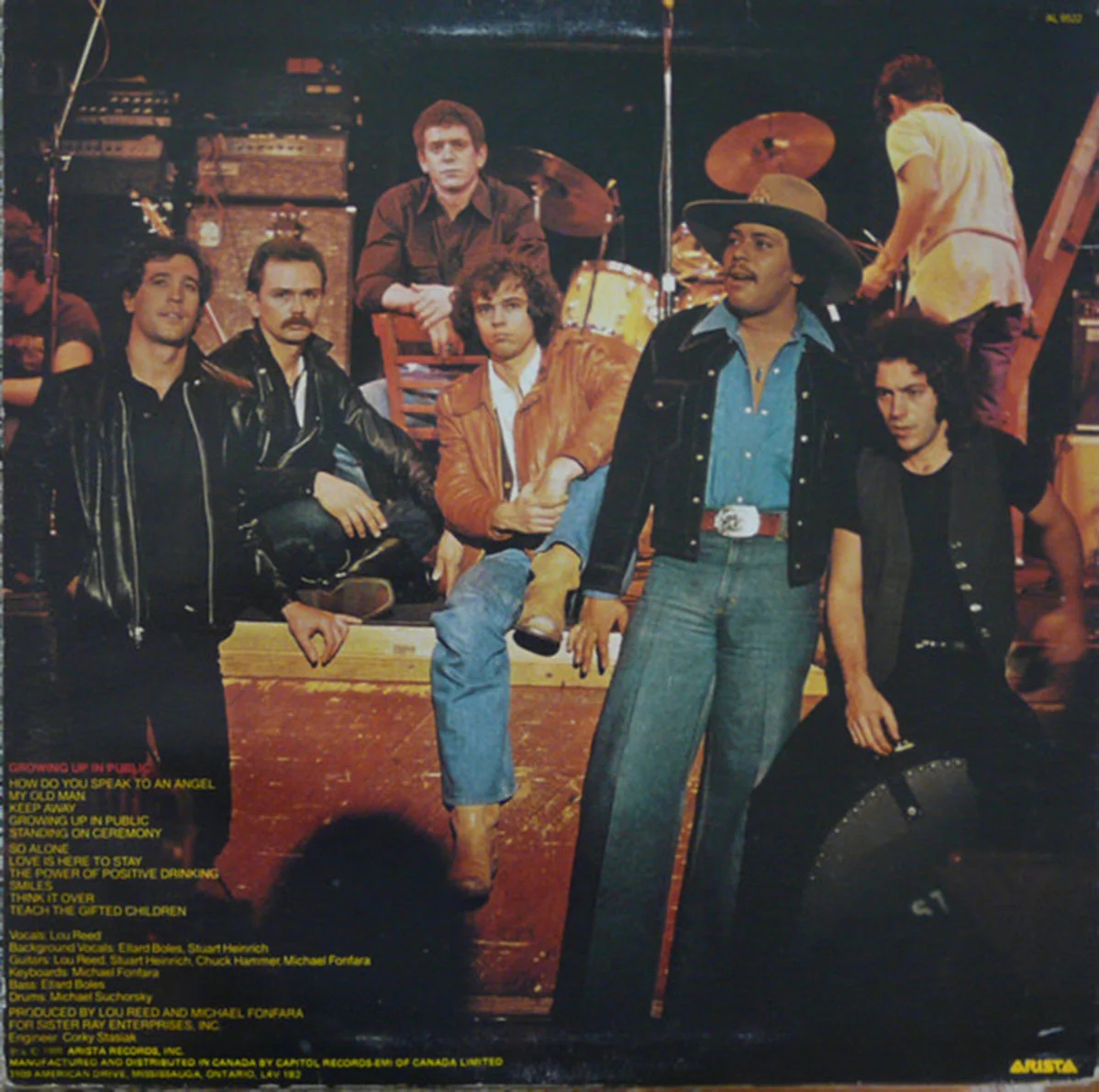The original sleeve concept for Growing Up In Public was to capture the vibe of a 1950’s supper club entertainer in a pseudo-casual pose. The result was something very different. Album cover designer, second wife, and artistic manager of Lou Reed for 18 years, Sylvia (Morales) Reed, tells The Press.

By 1980, Lou Reed was out of places to go. Since leaving The Velvet Underground, Lou had been through multiple reinventions and worn many different masks throughout 10 years of celebrity, where his trials and tribulations were witnessed by hundreds and thousands of people.
From streetwise glam queen to self-destructive junkie misfit; avant-garde experimentalist to punk rock godfather; it was on the confessional Growing Up In Public, released on Clive Davis’ Arista label, where his everyman persona found a new dimension to work in, and elevated his lyrics into a serious, literate, art form.
The Album
Upon release, the self-produced Growing Up In Public was considered an outlier among his previous work. Lou plays less guitar, and he addresses, head on, themes of alcoholic guilt (‘The Power of Positive Drinking‘), shame (‘Keep Away‘), and personal struggles (‘My Old Man‘), delivered in a brutally honest autobiographical tone, hidden in the bravado of a perfunctory five-piece “Everyman Band” led by keyboardist and long-time Lou sideman, Michael Fonfara (who co-wrote every song with Reed). The performances are energetic despite the dour lyrical overtones, and the overall sound of the record remains very much of it’s time.
The best track on the album, and one of the standouts from this era, is the heartfelt ‘Think it Over‘ – a moving love song to his wife-to-be, Sylvia Morales. The instrumentation is exquisite, and the vocal performance subtle and restrained. The track starts beautifully, with a gentle, finger-picked, electric guitar, before Lou enters the scene:
Waking, he stared raptly at her face / On his lips, her smell, her taste / Black hair framing her perfect face / With her wonderful mind and her incredible grace
Sylvia was Lou’s constant companion and artistic collaborator for eighteen years, handling management duties and stage and lighting design during what may have been the most prolific and artistically rewarding period of his life and career. Sylvia also was instrumental in many of his album cover designs.
The Cover
After meeting in the infamous CBGB scene in 1977, the couple frequented a retro NYC lounge that would become the central inspiration to the lyrical and visual themes explored on the record:
Sylvia: There was a lot of talk and intense conversation in my relationship with Lou Reed. We were seeing each other for a few years before our marriage and it was a few months after we both understood that this was going to be a meaningful relationship that we spent time in a particular strange nightclub/lounge, talking for hours. It had the vibe of a 1950’s supper club, that had once been considered elegant but was now unfashionable.
They would observe and often comment on people they saw there, holding long conversations about what sort of entertainers would perform in the lounge, what they would sing, wear, and what the audience would be like:
Sylvia: Lou and I spent time together exploring what the meaning and emotional impact of these sort of posed pseudo-casual images signified – it made a strong impression on me. We returned several times to this same bar/lounge where he engaged in a self aware analysis of his place in the rock music scene.
This sparked discussions on tracing the emotional impact and inspiration of a certain genre of male-singers and their accompanying album cover designs: suave, pseudo-casual, sporting velour fabric:
Sylvia: We talked about the appeal of a certain genre of album cover art, from a particular time period of the Sinatra albums, in particular 1957’s Where Are You?. Sinatra wears a collared shirt under a sweater and is smoking with his arms partially hiding his face. This is an artistic rendering of a photograph. There are other male singers who used similar album art – 1960’s Dean Martin Sings is one. 1957’s Perry Como Dream Along With Me is another.
A couple of years later when prepping the cover art for Growing Up In Public, Sylvia reminded Lou of the conversations they had engaged in back at that strange 50’s supper club, and drew up some fast sketches.
Sylvia: Lou was in a period of self-reflection, examining every aspect of what he had accomplished in his work up to that point, and whether it was understood. And this wandering together and being in unusual places, observing and commenting on people we saw there, this had everything to do with the material that inspired Growing Up In Public.
A photo session was then booked with a photographer who had, by then, worked with Lou multiple times (Transformer, Sally Can’t Dance, Coney Island Baby, Rock And Roll Heart), and who had created some of the most iconic images rock music has ever seen: Mick Rock.
The resulting image turned out to be one of the more unusual Mick Rock portraits. A little disturbing, a lot less glamorous. A look into the soul of the artist. On the finished cover, Lou exhibits a strained, brooding expression, both world-weary and vulnerable:
Sylvia: But the photos were remarkably different from what I’d expected. It was a take on the earlier Male Singer in a casual sweater look, and it was posed to present the image as slightly arch or cynical.
A re-shoot was encouraged, but Lou loved that image and went with it. Ultimately it works, particularly in the context of the album:
Sylvia: But the odd result was that the photo of Lou (wearing a velour pale olive sweater) captured him in an absolutely raw, vulnerable moment. It was full of honesty and revealing of the damage done in the drug years that he was just emerging from. And I think it was a perfect cover for the content of that album’s lyrics, which evoked years of struggle and pain but perhaps some tenderness and hope as well.
The Aftermath
Growing Up In Public remains a fascinating document and a necessary step in the evolution of Lou Reed’s career. It would open the door to an artistic resurgence well into the 1980’s and beyond, beginning a major return to form with The Blue Mask in 1982, where Sylvia would reimagine Mick Rock’s famous Transformer image, but it was here where Lou turned the page, finished with the drugs and the madness, and started to honour his gifts by taking his songwriting seriously.
Sylvia Reed would go on to design the album covers for The Blue Mask, Legendary Hearts (1983), Mistrial (1986), New York (1989), Songs for Drella (1990), and collaborate with Spencer Drate and Judith Salavetz on designs for Magic and Loss (1992), and The Velvet Underground Redux Live MCMXCIII album and promotional material from 1993.

L to R: Chuck Hammer, Michael Fonfara, Lou Reed, Michael Suchorsky, Ellard Boles, Stuart Heinrich. This was photo was shot by Mick Rock in NYC, at The Bottom Line a few days prior to the band leaving to record the album in George Martin’s AIR Studios, Montserrat (1979-1989).
NB: Special thanks to Sylvia Reed for personally providing me information on the cover design.
NB2: This is the album Lou asked David Bowie to produce, who declined, resulting in a very public punch up at the Chelsea Rendezvous restaurant in London, 1979.
Photo: Allan Tannenbaum, 1979. Lou Reed and Sylvia Morales attending the opening of an exhibition of works by the late Ronnie Cutrone.
Further Reading:
♥ Lou Reed | New York (1989) More Album Cover Outtakes
♥ Lou Reed | Top 50 Solo Songs
♥ Un-Double Album | Rock ‘n Roll Animal & Lou Reed Live





An album and if im honest an artist I really don’t know much about. So often I run across covers of his songs so if nothing else I’ve grown to appreciate his skill as a songwriter.
All good randy. Well worth a listen if so inclined. As I mentioned, I think it’s an important moment in Lou’s career while perhaps not his finest hour musically. The man is well worth checking out.
A great Reed, Pierce 😁
Seriously though, top notch article. You touch on so many interesting points. Really found myself devouring it. Great stuff!
Thanks for reading Chris!
A marvelous review of an album I wasn’t familiar with.
Thanks for reading EML.